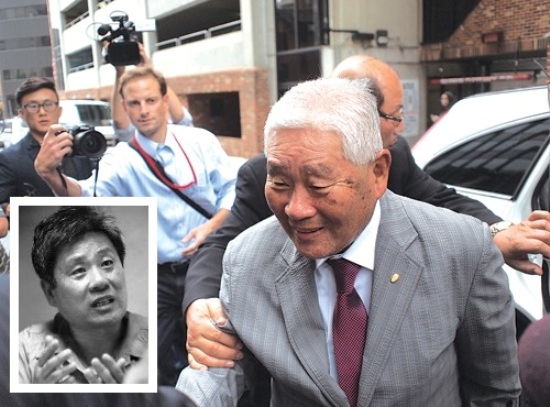- California Assembly OKs highest minimum wage in nation
- S. Korea unveils first graphic cigarette warnings
- US joins with South Korea, Japan in bid to deter North Korea
- LPGA golfer Chun In-gee finally back in action
- S. Korea won’t be top seed in final World Cup qualification round
- US men’s soccer misses 2nd straight Olympics
- US back on track in qualifying with 4-0 win over Guatemala
- High-intensity workout injuries spawn cottage industry
- CDC expands range of Zika mosquitoes into parts of Northeast
- Who knew? ‘The Walking Dead’ is helping families connect
Case against Korean man in daughter’s 1989 fire death is dropped

Han Tak Lee was 55-years-old when convicted of arson-murder. He is now a free man, as an eastern Pennsylvania prosecutor has finally decided to drop the case, but he has also turned 80 years old. (Korea Times file)
(AP) — An elderly man who spent 24 years in prison for his daughter’s death in a fire before his conviction was overturned will remain free now that an eastern Pennsylvania prosecutor has decided to drop the case.
Han Tak Lee, a native of South Korea who earned U.S. citizenship, was exonerated and freed last year after a judge concluded that his 1990 conviction was based on since-discredited scientific theories about arson. A federal appeals court upheld the ruling in August.
Monroe County District Attorney David Christine said Tuesday that he decided not to appeal to the U.S. Supreme Court, calling the chance of success too remote. He said a retrial of Lee, 80, is impossible due to loss of evidence and witnesses.
“We believe we have done our best to fulfill our obligation to defend the jury’s verdict against Mr. Lee,” Christine said. “All legal avenues to preserve the verdict have now been exhausted.”
Lee’s longtime attorney, Peter Goldberger, said he was “very gratified that justice has finally prevailed and that this long sad saga is over.”
Lee’s conviction was one of dozens to be called into question around the United States amid revolutionary changes in investigators’ understanding of how an intentionally set fire can be distinguished from an accidental one.
Lee, a New York City shop owner, had taken his 20-year-old mentally ill daughter to a religious retreat in Pennsylvania’s Pocono mountains, where, prosecutors say, he set fire to their cabin. Lee has long contended the 1989 fire was accidental.
A state police fire marshal testified at Lee’s trial that the wood in the cabin was deeply charred and blistered, that the windows had a series of tiny fractures and that he had found at least eight points of origin for the fire, all evidence of arson, according to the orthodoxies of the day.
The jury convicted Lee of murder and sentenced him to life without parole.
After years of appeals, the 3rd U.S. Circuit Court of Appeals granted Lee’s request for an independent review of the evidence. The review, led by a magistrate judge, concluded the expert testimony used to convict him was based on “little more than superstition.”
Lee returned to Queens after his release from prison.












![일본 사도광산 [서경덕 교수 제공. 재판매 및 DB 금지]](http://www.koreatimesus.com/wp-content/uploads/2024/07/PYH2024072610800050400_P4-copy-120x134.jpg)


